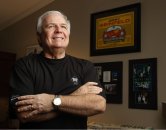How I Got Pulled into Charlie Kirk’s Movement—and Why I Left

Two months before American right-wing activist Charlie Kirk was assassinated on September 13 while addressing an audience at Utah Valley University, twenty-eight-year-old Caroline Stout felt compelled to post a video to her social media accounts. In it, she reflected on her time with Turning Point USA, the non-profit conservative campus organization Kirk co-founded.
“I felt strongly that I needed to speak out against the current administration. And figuring out my own experience would be the best place to start,” Stout tells me from her home in Amarillo, Texas. Stout began working for Turning Point in 2014, at age seventeen—two years after the organization was formed—and resigned in May 2017, just months after United States president Donald Trump first took office.
The video had gained a lot of traction when it was put out in July and then picked back up and was recirculated after Kirk’s death.
Stout, who works as a lawyer and a writer, says she grew up in a very conservative bubble outside of Houston, Texas, and, as a privileged white woman, was never forced to confront her politics or think for herself about what she believed in. “I grew up in a strong-faith community and attended a megachurch where being conservative was the default,” she says. “I believed you could not be a Christian and also a Democrat; it was ingrained in me that those two things were incompatible. My community of origin was a fusion between a conservative ideology and an evangelical faith ideology. I couldn’t question one without also questioning the other.”
Stout spoke to The Walrus about why she joined Turning Point USA, what it was about Kirk that made his message so intoxicating to young people, and what made her question her political conditioning.
You were in high school when you joined Turning Point USA. What made you want to get involved?
I was involved with my local Republican Party. At this point, Charlie was going around fundraising. He held a kind of recruitment meeting for young people interested in politics in Houston. That was the first time I met him, when he made his pitch for Turning Point. His refrain was: “We only focus on limited government and fiscal responsibility. That’s it. We don’t focus on social issues, because that divides us.” That was really digestible for me at the time, because I really wasn’t sure where I stood on some social issues. And it’s easy to get behind fiscal responsibility and limited government. So it seemed pretty innocuous to me.
Seventeen is an age when people are especially impressionable.
I remember going to CPAC [the Conservative Political Action Conference] in Washington, DC, in 2015. Being a teenager, you’re seeing presidential candidates and media figures. You’re made to feel chosen and important. I didn’t want to lose access to this world. So, in order to get that sense of belonging within the organization, all you had to do was mirror them and parrot back their talking points to move up and be considered an activist.
What drew you in about Kirk specifically?
One of the things he focused on was making you feel like you were the exception to other young people. He would say: “Oh, you can see through what the liberals are trying to tell you. They’re not going to trick you. You’re smarter than other people your age.” As a young person interested in politics, an eldest daughter, a people pleaser, being told that I was the smart one and different—that was very appealing to me. It was exciting to feel accepted on such a level.
That’s exactly what they’re doing now to high school and college kids, except on a larger scale. They’re saying to these kids, “You’re not brainwashed by the liberal elites. You can see through what they’re trying to indoctrinate you with.” Yet they’re handing you a perfectly packaged political ideology that you don’t have to develop yourself. It’s pretty insidious.
How much of Kirk’s appeal came from his ability to make conservatism feel like a brand for young people?
Turning Point was good at making conservatism feel relevant. They would say: “This isn’t Bill O’Reilly conservatism. This is a new movement.” They made it seem like you belonged to a movement with a cohesive brand identity. It was polished. This was 2016, when social media was heavily curated, so that kind of branding was especially appealing to people my age.
In your video, you say a lot of what you did for Turning Point was to write articles specifically designed to scare people and garner traffic and really just ratchet up the intensity of the political moment. Did you ever write something you knew was misleading or exaggerated?
I don’t think I knew this at the time. This was when I thought Fox News was Bible truth. We believed we were fighting the left and speaking the truth.
I started to notice it in the stories I was writing, most of them focused on so-called liberal bias on campus. I’d publish pieces about higher education “indoctrinating” young people, but I’d find myself thinking, “This seems reasonable—it’s not a big deal to have an LGBTQ event.” Then another story would come across my desk about the “crazy stuff” the left was doing, and I’d wonder, “Why are we focusing on this? Why are we trying to expose something that doesn’t actually seem like a big deal?” Much of the campus news felt exaggerated, framing ordinary events as something nefarious.
Of course, in retrospect, it was an attempt to demonize higher education and perpetuate anti-intellectualism.
How much responsibility do you think Kirk bears for the climate of fear and outrage that has reshaped American politics?
When MAGA started to take over, Kirk really leaned into its rise. He was very ambitious, and so there was a major shift in his rhetoric during the first Trump administration. Early on, he even gave an interview emphasizing the importance of viewing policy through a secular lens. But in recent years, his message became much more aligned with Christian nationalism. That evolution tracks closely with the broader rise of Christian nationalism in politics and with MAGA. I wouldn’t place all the blame on him, but the embrace of nationalist and fascist rhetoric—anti-immigration, xenophobia, and Christian nationalism—is something for which he does bear responsibility.
So then was he personally radicalizing people, or was he simply channelling the currents that were already there?
Yes and yes. I think he saw a chance to up the stakes and raise the tension—because getting people excited is something he did really well. Excitement can also come from anger and fear, and he recognized that. He seized that opportunity, and it coincided with the broader political landscape of the time.
You left Turning Point in May 2017. What was the crack in the facade—was there a single event that made you doubt everything?
It wasn’t a specific moment. It happened over time, as I kept writing the articles and seeing the bias in them—bias I didn’t see the purpose behind. I started to question why they were using this language and why they were framing things a certain way. The agenda in conservative media became harder to ignore. That’s when skepticism began to creep in. And then there was the rhetoric that came with the rise of Trump. I couldn’t reconcile it with my empathy for others. I couldn’t reconcile it with my world view and my desire to treat people well. It was a slow process.
Once Trump took office in 2017, I was no longer working as an editor full time—I stepped back to part time. I focused more on lighter subjects, like pop culture and listicles. I was just pretty jaded. And then after that, Turning Point restructured and got rid of the writing program, so I took that as an opportunity to be like, “I’m out,” without having to outright quit and it having to be a big deal.
After you left the organization, did you notice a big change in his rhetoric over time?
Absolutely. After I left Turning Point, I refrained from consuming a lot of political content for a while. But once I started to plug back in and saw the Christian nationalism aspect of the group start to rise, as well as the anti-immigrant, anti-trans, anti-LGBTQ rhetoric, I would be like, “How is this the same person? How is this the same person who said we’re only focusing on limited government and fiscal responsibility?” It was really hard to reconcile that change.
You say that, initially, Kirk didn’t want the organization to focus on social issues. But in recent years, he talked about social issues a lot.
A lot of the issues Turning Point raised had inherently social implications. To pretend otherwise was a convenient way to hide the real stakes of conservative policy. The refrain was, “Oh no, we don’t talk about social issues, this is all intellectual.” But when you’re opposing universal health care, or promoting “school choice,” or defending free speech only when it benefits conservative groups on campus—these are all positions that carry social consequences.
Once he established the organization and it grew prominent enough, there was a lot more flexibility and willingness to talk openly about social issues, because now he was backed by a growing base of supporters.
You say your feelings about his death are complicated. How so?
I don’t feel complicated about condoning political violence. I don’t celebrate what happened to him—I strongly condemn it. The complicated feelings are much more personal in that it’s almost like I grieve the person I knew a long time ago. Once he took that deep dive into the far right and into MAGA and became a staunch Trumper, I grieved the principled and kind person I had worked for.
You also say that you wouldn’t be the person you are today if it wasn’t for Charlie Kirk.
I think about the opportunities I had with Turning Point. The people that I met, the friends I made, learning how to network at a young age. Being part of Turning Point gave me a sense of purpose. It gave me a voice, whereas before, I felt like I was just another kid. Whether it’s right or wrong, it was a platform where young people were still figuring out their views. It gave me confidence, and it fostered an interest in politics and policy making. It inspired me to go after what I wanted.
If it hadn’t been for Turning Point, I don’t think I’d be doing what I am today. Maybe I would have found my way here in a different capacity, but I walked away from Turning Point a more self-possessed person than I was when I started.
The post How I Got Pulled into Charlie Kirk’s Movement—and Why I Left first appeared on The Walrus.

Comments
Be the first to comment